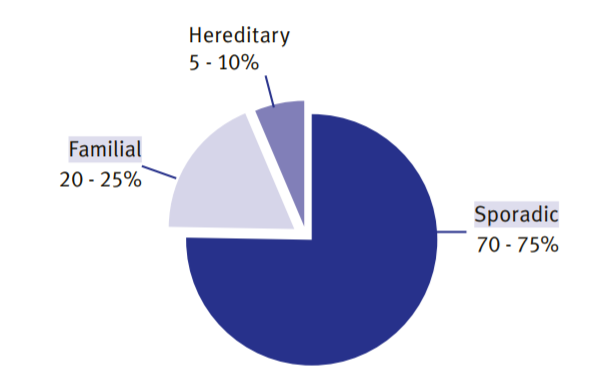Section 1: Understanding Genetic Test for Cancer
All Cancer Is Genetic, Most Is Not Hereditary
All cancers are the result of gene mutations. Mutations may be caused by aging, exposure to chemicals, radiation, hormones or other factors in the body and the environment. Over time, a number of mutations may occur in a single cell, allowing it to divide and grow in a way that becomes a cancer. This usually takes many years, and explains why most cancers occur at a later age in life. Because people are not born with these acquired gene mutations, they cannot pass them on to their children.

A small number of cancers are hereditary. This means that they are related to a specific gene mutation that is passed down (inherited) in a family. A person who is born with a mutation has it in every cell in his/her body, including some of the eggs or sperm. This means it may be passed down to the next generation. Individuals who inherit such gene mutations have a higher risk of developing certain forms of cancer compared to the general population. Inherited gene mutations help to explain why in some families, we see more people than expected with certain kinds of cancer.
Genetic Testing for Cancers
Genetic testing for cancer risk can help estimate the chance of developing cancer in your lifetime. More than 2,000 genetic tests are available for different disease which includes, ovarian, colon, thyroid, and other cancers. The test analyse your genes, chromosomes, or proteins to help:
- Predict your risk of developing a particular disease
- Find out if you have genes linked with increased cancer risk that can be passed on to your children
- Determine how to manage increased cancer risk such as more frequent screening or different ways to lower risk
Genetic test cannot report with 100% certainty if you will develop cancer. However, the test can tell if you have a higher risk of developing cancer than the general population. Not everyone with a gene mutation that increase the risk of cancer will develop the disease. For example, a woman with a 75% chance of developing breast cancer may remain healthy. On the other hand, a woman with 25% chance of breast cancer may eventually develop cancer. Hence, It is pertinent that you consult a genetic counsellor before and after the test.
The following factors suggest that a person may be at risk for developing a hereditary cancer. Hereditary cancer are any cancers caused by gene mutations or changed that can be inherited.
- Family history of cancer. Three or more relatives on the same sides of the family with the same or related forms of cancer.
- Cancer at an early age. Two or more relatives diagnosed with cancer at an early age.
- Multiple cancers. Two or more types of cancer in the same relative.
Hereditary Cancer
Hereditary cancer is cancer that runs in a family. It happens when a change (mutation) in a gene is passed down from one generation to the next. A person who is born with a mutation has it in every cell in his/her body, including some of the eggs or sperm. This means it may be passed down when that person has children. People who inherit such gene mutations have a higher risk of developing certain forms of cancer compared to general population. That is why hereditary cancer is seen at younger ages and more people than expected with certain kinds of cancer.
IN hereditary cancer, gene mutations are sometimes passed down from a father or a mother. Persons born with a gene mutation may or may not develop cancer but their risk of cancer is greater.
Cancer Genetic Risk Assessment

Section 2 Hereditary Breast and Ovarian Cancer (HBOC) Syndrome
Hereditary Breast and Ovarian Cancer (HBOC) Syndrome
HBOC is an adult-onset, cancer predisposition syndrome which can be passed down through generations. HBOC increases the risk of developing breast and ovarian cancers in women, prostate cancer in men, and other cancers such as pancreatic, and melanoma. While hereditary cancer is not common, it may affect how you and your family should be screened and managed.
Genetic change (mutation) in BRCA1 and BRCA2 genes is the most common caused of HBOC. Mutation in other less common genes have also been found to increase the risk of developing breast and other cancers. Individuals with BRCA1 or BRCA2 mutations tend to develop cancer at an earlier age than the population and have a higher risk for bilateral breast cancer, a second primary tumor in a different tissue and cancer recurrence.
In Singapore, breast cancer is the most frequent cancer occurring among women: lifetime risk for breast cancer is 6.45 % thus 1 out of 16 women will develop a breast cancer in Singapore. Whereas ovarian cancer is less frequent. About 5-10% of breast cancer and 15-20% of ovarian cancers can be attributed to HBOC. However, most families do not have HBOC syndrome.
The history of cancer in your close relatives is a clue to the chances of hereditary breast/ovarian cancer. Close relatives include your: children, brothers, sisters, parents, aunts, uncles, grandchildren, and grandparents, on one side of the family. History of cancer in cousins and more distant relatives may also be important. An inherited mutation in the BRCA1 or BRCA2 genes is more likely if at least 1 of the following features can be confirmed in your family:
• A woman with breast cancer diagnosed at age 35 or younger
• A woman with ovarian cancer
• A woman with breast cancer and ovarian cancer
• A woman with 2 or more separate breast cancers, if the 1st diagnosis was at age 50 or younger
• A man with breast cancer and a close relative with breast cancer or ovarian cancer
• A woman with breast cancer and a close relative with ovarian cancer
• 2 closely related women with breast cancer, both diagnosed at age 50 or younger
• 3 closely related women with breast cancer, at least one of whom was diagnosed at age 50 or younger
Diagnosis of HBOC Syndrome
Genetic testing for HBOC syndrome is a blood test that is available through Innovative Diagnostic when specific criteria are met. Genetic testing is complex; thus, it does not take place without genetic counselling from a clinician and the informed consent.
If your family history of cancer suggests HBOC syndrome, please talk to your doctor. A referral to Innovative Diagnostic can help you find out more about HBOC syndrome and genetic testing. If you are concerned about your risk of breast and ovarian cancer or other cancer, talk to your doctor and consider the following questions:
1) What is my risk of developing breast and ovarian cancers?
2) What can I do reduce my risk of cancer?
3) What are my options for cancer screening?

